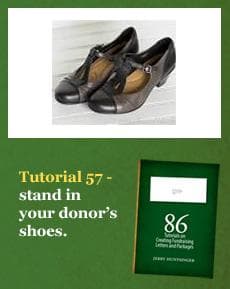Tutorial 57: stand in your donor’s shoes
- Written by
- Jerry Huntsinger
- Added
- January 03, 2019

Someone somewhere is waiting for your mail. She could be a legacy prospect. Have you excluded her from your mailing list because she gave so little last time – even though she’s been making donations for years?
This touching story will put you in the shoes of that donor who is waiting for your mail. And it will make you think about your target direct mail audience – who you should be mailing and what your direct mail packages should communicate.
Maggie’s connection to the outside world
Maggie was early. It was only 1:30 pm and the post office door did not open until 2:00 o’clock sharp. But it was Christmas Eve and she was feeling particularly lonesome.
It wasn’t that she didn’t have friends. Here at the Assisted Care Centre, everyone was her friend. But often she tired of the small talk, the continual chatter and the analysis of physical infirmities.
She wanted to be connected. To the outside world. And the mail room was her link.
She had lived at the Assisted Care Centre for almost two years. She couldn’t drive, she couldn’t walk more than 100 feet, or for longer than 10 minutes, whichever came first. Her husband had been gone for almost 12 years now; her unmarried daughter and two grandchildren never wrote, visited, or telephoned and probably never would. Maggie was more than willing to forget and forgive, but they weren’t.
And about once a week Maggie would work up her courage to place a telephone call and just ask how they were getting along. But she had never handled rejection very well and if the call was not successful, then the pain would only be more severe.
Today was especially difficult, because other folks at the Care Centre were opening their Christmas presents and the lobby was full of visitors. But there would not be any visitor today for Maggie. So she sat on a wooden bench, waiting for the little post office to open and remembering how so often her mailbox had connected her to the outside world.
She didn’t mind that almost everything she received was advertising or fundraising and she dearly loved the invitations to join a tour group and investigate the marine life in the Australian Great Barrier Reef. Each time she received such a promotion she wrote a small question and mailed it back, sometimes she would receive a personal letter answering her question.
Of course, she knew that she would never go on that tour but, still, asking questions such as, ‘should I bring my own snorkeling gear?’ was just – well, fun. And when she was a young woman she had been an expert swimmer and, in fact, one summer while in college, had worked on a beach as a lifeguard. Those were the days.
And it worried her that she could remember events that happened 70 years ago better than events that happened two days ago. Was it Alzheimer’s disease, or just forgetfulness? And is there a difference?
Perhaps today she would receive something from the Alzheimer Association, because she sent them a $5 cheque, once a year, even though the last advertisement she had seen in Modern Maturity magazine troubled her deeply, because the headline said, ‘Imagine not remembering your own daughter’s name ...’ Well, she remembered her daughter’s name and her grandchildren’s names and she wondered if they ever thought of her, or ever felt guilty, or understood her pain of separation.
Or maybe she would receive a catalogue from Nordstrom. Expensive and trendy stuff, but once a year she would buy something out of the catalogue – a small item, maybe only $12.50 plus shipping and handling. That would guarantee that she would continue to receive the catalogue for another year or more. She knew the rules. She had to make a purchase now and then to stay on the mailing list and the Nordstrom catalogue gave her daydreams far superior to something ridiculous, such as winning the lottery.
And maybe, on this Christmas Eve, her mail would bring her a ... she drifted off to sleep.
When she awoke the little waiting room outside the post office was full of other women and two gentlemen sitting around on the benches smiling at each other politely, making small talk, and she knew that these folks were also trying to survive Christmas Eve. They rarely talked about their own particular situation – that was considered bad manners. Once she had gone to a ‘friendship meeting’ and the counsellor had encouraged everyone to talk about outside life, but Maggie found that to be transparent. She didn’t need or want or require therapy. All she really wanted was to talk to her daughter and granddaughters.
And she rarely thought about the future – and her own inevitable demise. Should she make a living will? Should she send a gift to one of those assisted dying organisations? Yes. That was a good idea.
Suddenly, the post office door opened.
Maggie entered the little post office together with the others. She opened the small door of her personal mailbox and felt with her hand and ... yes! It was a stack! Held together by two rubber bands.
As she pulled out the stack, she could see that on the bottom were several magazines, several large pieces of mail and, nestled in the centre of the stack, were six or seven more envelopes and one of them even had a stamp on it – a good sign.
She wanted to rush immediately to her room and there, in privacy, savour her mail. But the protocol after the mail room opens is quite rigid and requires her to go back into the waiting room, sit on a bench and talk with the other folks who have been waiting for their mail. The reason for that is because several of the women need to rest awhile before walking back to their rooms.
So Maggie plays the game, all the while planning her late afternoon and evening activities. She will go through the mail rather quickly, sorting the items, probably 12 or 14 in all, then she will open everything that is first class mail, give it all a quick read, and put it in a small open box on her desk.
Next, she will organise the so-called ‘junk mail’ – even though she doesn’t understand why it’s called that, because a beautiful catalogue from Nordstrom full of fabulous photography can hardly be called junk.
Finally, she will put the catalogues and everything that isn’t first class mail on her reading table and then, as the day progresses, she will read every catalogue word for word, every piece of mail word for word. Finally, before she goes to bed, she will decide what items in today’s mail to keep for further exploration – what items to answer, what coupons to fill out and what pieces of mail to put in a separate stack on her desk that she calls her 'undecided file'.
On days when she is particularly bored, when there isn’t anything to watch on any of the cable channels and she can no longer tolerate the continual chatter of the other folk in the Care Centre, she’ll read through this ‘undecided file’ and then – decide. Keep it awhile longer? Or throw it out?


















